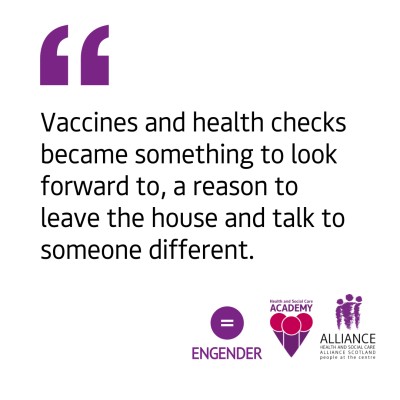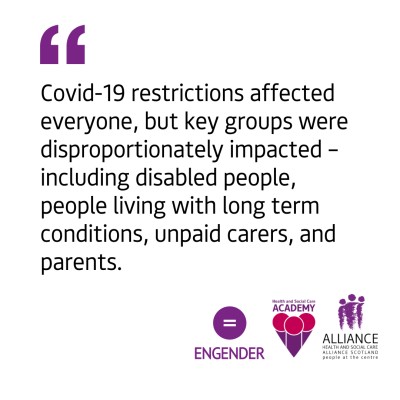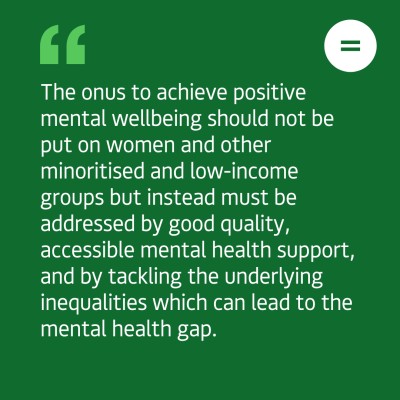Engender blog
All of Engender’s latest news. Reports, reviews, books, articles, and information from across Scotland’s women’s sector.
We would love to hear from other feminists around Scotland. Check out our guidelines for more information on how you can blog for us.
GUEST BLOG: Lockdown (maternity) leave

We've been working with the ALLIANCE and The Health and Social Care Academy to gather information about experiences of pregnancy and maternity services during Covid-19 from women across Scotland. Alongside our work, we're sharing a series of guest blogs reflecting on those experiences. Here, Eilidh shares her experience of post-partum support during the pandemic.
My eldest was born in early March 2020, meaning my pregnancy and birth happened back in the old normal, where facemasks were rare and social distancing wasn’t a phrase yet. We left hospital to the same kind of new normal that every new parent enters, where days merge together in a haze of sleepless nights, breastfeeding and nappies. We had visits from family and tried to find our feet, mostly unaware of the world changing outside.
Gendered online harassment – what’s law got to do with it?
-400.png)
Claire Kish is currently in the second year of her PhD in Sociology and is based in the University of Glasgow’s Sociology department. Her PhD research explores the online harassment of women in journalism focusing on professional harms and organisational dimensions. Here she writes about a project she has been working on with Engender:
I recently completed a project for Engender which explores the legal responsibilities of employers with respect to the online harassment of workers. I specifically focused on women journalists because they face significant and severe abuse online, often as a result of performing key duties of the role. Yet the results have wider significance - especially as more work shifts online and employers increasingly utilise social media for business purposes. These changes have significant gendered and intersectional impacts as there are risks associated with being online which for women, especially minoritised women, are amplified. Given that women journalists are facing online harassment when carrying out work for their employers, we need to approach this as an employment and workers’ rights issue. So my project examined existing UK employment laws to identify and understand what legal duties employers have to uphold the rights of their women employees.
GUEST BLOG: Maternity and pregnancy services during Covid-19

We've been working with the ALLIANCE and The Health and Social Care Academy to gather information about experiences of pregnancy and maternity services during Covid-19 from women across Scotland. Alongside our work, we're sharing a series of guest blogs reflecting on those experiences. Here, Hannah Tweed reflects on her experience of pregnancy services in 2020.
This month the ALLIANCE and Engender launched a survey on people’s experiences of pregnancy (and everything after) during the Covid-19 pandemic.
To be frank, reading through early drafts of the survey was distinctly uncanny. I was pregnant with my daughter when the pandemic started, and she was a #LockdownBaby of 2020 – which, as a larval human with binary needs, probably did her no real harm. I’m not sure I’d say the same of my experiences as a new parent (and particularly one who spent my second and third trimesters immersed in public health policy).
Cost of Living Crisis: The financial impact on women's access to housing
-400.png)
As part of our blog series on the cost of living crisis, Dr Melissa Espinoza looks at how a national/global crisis can exacerbate existing barriers for specific populations, and how the current financial crisis interacts with women's experiences of housing and homelessness.
When discussing the financial crisis, we must consider the difficulties of often overlooked populations. For some, the financial crisis will be a temporary and challenging time, but not a long-term way of living. Many people had already long been struggling to survive. They were already operating in crisis mode before the financial crisis. For many, the financial and housing rental crises have been years in the making.
Covid-19 is a clear example of how a national/global crisis can exacerbate existing barriers for specific populations. In other words, an increased cost of living always hits the poorest first and hardest. According to a recent report by the Women’s Budget Group (WBG), “[o]ver a decade of austerity policies, low wage rises and cuts to social security have left many people in poverty. While the richest households saved money during the pandemic, the poorest fell further into debt, with no cushion to cope with rising prices now.” Hence, many bought new homes while many people also could no longer afford their rents during the pandemic. The media conversations about the cost of living focus on households who are newly experiencing financial burdens due to the cost of living rises. However, many renters and people living in temporary accommodations struggle to keep a roof over their heads and escape the cycle of living paycheck to paycheck. Even more difficult would be for people to move into affordable accommodation after experiencing homelessness.
The mental health gap for women in Scotland

Women’s social, economic, cultural and political inequality with men undermines good mental health and wellbeing in a wide range of ways, including the impacts of gender stereotyping, medical misogyny and racism, and of course the disproportionate impact that austerity, Covid-19 and the cost of living crises have on women's mental health.
Recently Engender was invited to speak to civil servants working in the Scottish Government's Mental Health Strategy and Co-ordination unit, about the ways in which women's ineqaulity and mental health intersect. Here are some of the things we spoke about.
Downloads
 Engender Briefing: Pension Credit Entitlement Changes
From 15 May 2019, new changes will be introduced which will require couples where one partner has reached state pension age and one has not (‘mixed age couples’) to claim universal credit (UC) instead of Pension Credit.
Engender Briefing: Pension Credit Entitlement Changes
From 15 May 2019, new changes will be introduced which will require couples where one partner has reached state pension age and one has not (‘mixed age couples’) to claim universal credit (UC) instead of Pension Credit.
 Engender Parliamentary Briefing: Condemnation of Misogyny, Racism, Harassment and Sexism
Engender welcomes this Scottish Parliament Debate on Condemnation of Misogyny, Racism, Harassment and Sexism and the opportunity to raise awareness of the ways in which women in Scotland’s inequality contributes to gender-based violence.
Engender Parliamentary Briefing: Condemnation of Misogyny, Racism, Harassment and Sexism
Engender welcomes this Scottish Parliament Debate on Condemnation of Misogyny, Racism, Harassment and Sexism and the opportunity to raise awareness of the ways in which women in Scotland’s inequality contributes to gender-based violence.
 Gender Matters in Social Security: Individual Payments of Universal Credit
A paper calling on the Scottish Government to automatically split payments of Universal Credit between couples, once this power is devolved to the Scottish Parliament.
Gender Matters in Social Security: Individual Payments of Universal Credit
A paper calling on the Scottish Government to automatically split payments of Universal Credit between couples, once this power is devolved to the Scottish Parliament.
 Gender Matters Manifesto: Twenty for 2016
This manifesto sets out measures that, with political will, can be taken over the next parliamentary term in pursuit of these goals.
Gender Matters Manifesto: Twenty for 2016
This manifesto sets out measures that, with political will, can be taken over the next parliamentary term in pursuit of these goals.
 Scottish NGO Briefing for UN Special Rapporteur on Violence Against Women
Joint briefing paper for the UN Rapporteur on Violence Against Women.
Scottish NGO Briefing for UN Special Rapporteur on Violence Against Women
Joint briefing paper for the UN Rapporteur on Violence Against Women.

Newsletter
Sign up to receive our newsletter here:
Sign up to our mailing list
Receive key feminist updates direct to your inbox: